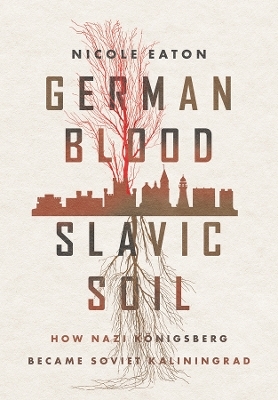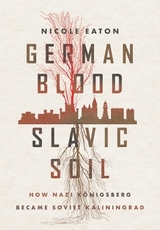German Blood, Slavic Soil
How Nazi Königsberg Became Soviet Kaliningrad
Seiten
2023
Cornell University Press (Verlag)
978-1-5017-6736-4 (ISBN)
Cornell University Press (Verlag)
978-1-5017-6736-4 (ISBN)
Winner of the Reginald Zelnik Book Prize in History
German Blood, Slavic Soil reveals how Nazi Germany and the Soviet Union, twentieth-century Europe's two most violent revolutionary regimes, transformed a single city and the people who lived there. During World War II, this single city became an epicenter in the apocalyptic battle between their two regimes.
Drawing on sources and perspectives from both sides, Nicole Eaton explores not only what Germans and Soviets thought about each other, but also how the war brought them together. She details an intricate timeline, first describing how Königsberg, a seven-hundred-year-old German port city on the Baltic Sea and lifelong home of Immanuel Kant, became infamous in the 1930s as the easternmost bastion of Hitler's Third Reich and the launching point for the Nazis' genocidal war in the East. She then describes how, after being destroyed by bombing and siege warfare in 1945, Königsberg became Kaliningrad, the westernmost city of Stalin's Soviet Union. Königsberg/Kaliningrad is the only city to have been ruled by both Hitler and Stalin as their own—in both wartime occupation and as integral territory of the two regimes.
German Blood, Slavic Soil presents an intimate look into the Nazi-Soviet encounter during World War II. Eaton impressively shows how this outpost city, far from the centers of power in Moscow and Berlin, became a closed-off space where Nazis and Stalinists each staged radical experiments in societal transformation and were forced to reimagine their utopias in dialogue with the encounter between the victims and proponents of the two regimes.
German Blood, Slavic Soil reveals how Nazi Germany and the Soviet Union, twentieth-century Europe's two most violent revolutionary regimes, transformed a single city and the people who lived there. During World War II, this single city became an epicenter in the apocalyptic battle between their two regimes.
Drawing on sources and perspectives from both sides, Nicole Eaton explores not only what Germans and Soviets thought about each other, but also how the war brought them together. She details an intricate timeline, first describing how Königsberg, a seven-hundred-year-old German port city on the Baltic Sea and lifelong home of Immanuel Kant, became infamous in the 1930s as the easternmost bastion of Hitler's Third Reich and the launching point for the Nazis' genocidal war in the East. She then describes how, after being destroyed by bombing and siege warfare in 1945, Königsberg became Kaliningrad, the westernmost city of Stalin's Soviet Union. Königsberg/Kaliningrad is the only city to have been ruled by both Hitler and Stalin as their own—in both wartime occupation and as integral territory of the two regimes.
German Blood, Slavic Soil presents an intimate look into the Nazi-Soviet encounter during World War II. Eaton impressively shows how this outpost city, far from the centers of power in Moscow and Berlin, became a closed-off space where Nazis and Stalinists each staged radical experiments in societal transformation and were forced to reimagine their utopias in dialogue with the encounter between the victims and proponents of the two regimes.
Nicole Eaton is Assistant Professor of History at Boston College. Follow her on X @nicolemeaton.
Introduction
1. The Bridge and the Bulwark
2. Empire in the East
3. Downfall
4. Liberation and Revenge
5. City of Death
6. Living Together
7. Slavic Soil
Conclusion
| Erscheinungsdatum | 04.03.2023 |
|---|---|
| Reihe/Serie | Battlegrounds: Cornell Studies in Military History |
| Zusatzinfo | 11 Halftones, black and white; 4 Maps |
| Verlagsort | Ithaca |
| Sprache | englisch |
| Maße | 152 x 229 mm |
| Gewicht | 907 g |
| Themenwelt | Geschichte ► Allgemeine Geschichte ► 1918 bis 1945 |
| Geschichte ► Teilgebiete der Geschichte ► Militärgeschichte | |
| Sozialwissenschaften ► Politik / Verwaltung ► Politische Systeme | |
| Sozialwissenschaften ► Politik / Verwaltung ► Politische Theorie | |
| ISBN-10 | 1-5017-6736-4 / 1501767364 |
| ISBN-13 | 978-1-5017-6736-4 / 9781501767364 |
| Zustand | Neuware |
| Haben Sie eine Frage zum Produkt? |
Mehr entdecken
aus dem Bereich
aus dem Bereich
ein Psychologe erlebt das Konzentrationslager
Buch | Hardcover (2024)
Kösel (Verlag)
22,00 €
Mythos „Stauffenberg-Attentat“ – wie der 20. Juli 1944 verklärt und …
Buch | Hardcover (2024)
Goldmann (Verlag)
24,00 €




